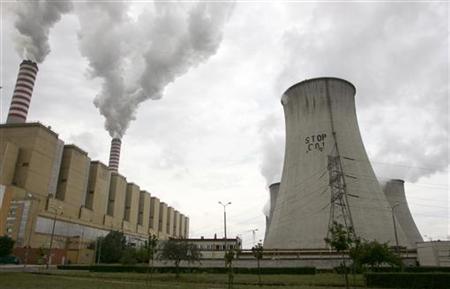Date: 06-Apr-09
Country: UK
Author: Michael Szabo
Polish Coal Plant Tops EU's

Greenpeace activists paint a slogan reading
Photo: Kacper Pempel
LONDON - Poland is home once again to Europe's dirtiest power plant, but
German utilities still owned 11 of the 30 most polluting facilities in the
European Union in 2008, preliminary EU data showed.
Poland's Belchatow coal plant, run by state-owned utility BOT Elektrownia,
spewed out the most climate-warming carbon dioxide (CO2) of any EU
installation last year, pumping the equivalent of 30.9 million tonnes into
the atmosphere.
This amount, comparable to the total greenhouse gas emissions of Croatia,
was nine percent more than the plant emitted in 2007 and bucked a trend
which saw overall EU industrial emissions drop last year.
The "dirty thirty", a term first coined by green group WWF in 2005, belched
some 387.5 million tonnes of CO2 in 2008, down 2.2 percent from 2007.
Analysts said emissions from all EU heavy industry fell by around 4-5
percent last year due to lower industrial production caused the global
economic downturn and power plants switching to burning natural gas over
more carbon-intensive coal.
The top emitter in 2007 -- Kraftwerk Niederaussem, owned by Germany's RWE --
saw its emissions drop by 20 percent to 24.9 million, the largest drop in
the group but not enough to keep it out of second place.
RWE owns 4 of the top 7 polluting plants.
The 11 dirtiest German facilities emitted 165.9 million tonnes of CO2 last
year, down 3.9 percent from 172.7 million tonnes in 2007.
Analysts said the drop in German industrial emissions was largely due to a
switch by utilities to burning bituminous coal from more carbon-intensive
lignite, also knows as brown coal.
Britain's top five polluters, including the dirty thirty's fourth-ranked
Drax power station, saw their total emissions rise by 2.6 percent to 60.1
million tonnes.
The British government last week said overall UK emissions fell by 2 percent
in 2008.
The thirty's largest net gain also came from Poland's Belchatow, up 2.5
million tonnes in 2008, while the largest percentage rise, 13.5 percent,
occurred at German steelmaker ThyssenKrupp's plant in Duisburg.
The preliminary data, a first glimpse into EU industrial emissions for 2008,
is widely watched by participants in the EU's emissions trading scheme, the
27-nation bloc's flagship weapon in its battle against climate change.
Scientists warn that rising atmospheric CO2 levels will cause global
temperatures to increase, which in turn could trigger widespread disease,
famine, flooding and drought.
The $90 billion emissions trading scheme caps EU industrial CO2 emissions,
then gives a corresponding number of permits to participants. Those
companies that seek to emit over their quota must buy permits from those who
have made emissions cuts.
Last year marked the first year that the European Commission avoided handing
out an excess of emissions permits to industry.
(Reporting by Michael Szabo; Editing by Keiron Henderson)
© Thomson Reuters 2009 All rights reserved
